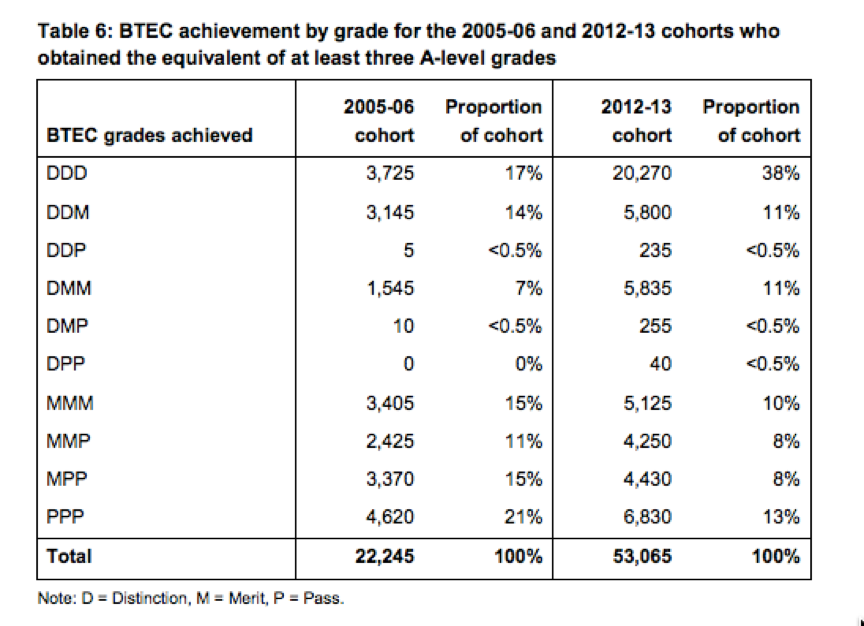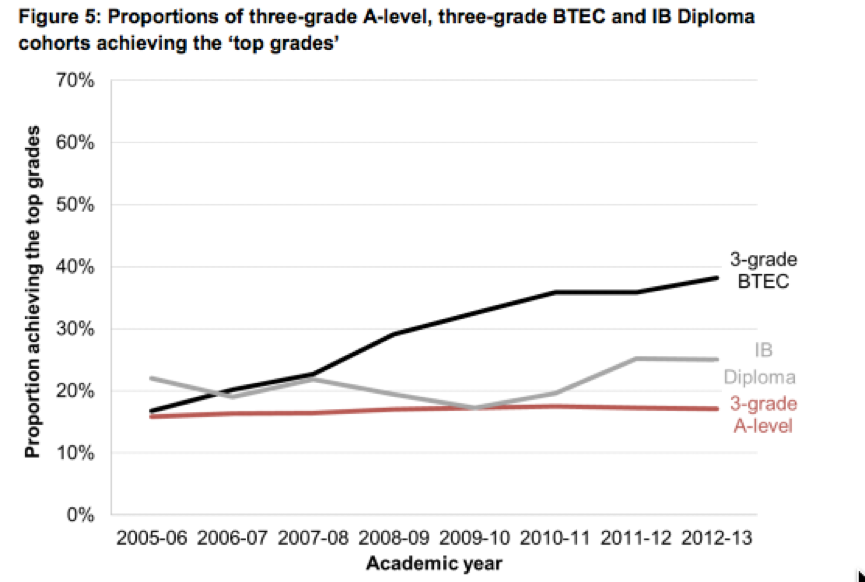When I wrote my last Daily Telegraph column critical of Btecs, an exam now taken by about a quarter of English university entrants, a friend of mine in the world of university admissions told me to wait for the reaction of Pearson Plc, which owns Btec. While A-levels and GCSEs are rigorously examined and discussed, Pearson get away with releasing very little data about Btec and plough a lot of money into marketing their exam. And they don’t very much like it being criticised.
Rod Bristow, the president of Pearson UK, has written to today’s Daily Telegraph suggesting that I was wrong to suggest that Btecs have gone through serious inflation – and, ergo, devaluation. I’m glad he has responded, as it has given me a chance to share some of the graphs, facts and figures that we seldom see mentioned or cited in the national debate. Our politicians care about A-levels and GCSEs: the exams they sat, the exams their children sit. Btecs are sat by other people’s children.
For the uninitiated, Btec is a qualification typically taken by those who fail to secure five good GCSEs – a vocational qualification. In recent years, A-levels have been getting tougher – and the reputation of this exam is rising. If you have BBB at A-level you’re twice as likely to get into a top university as you were five years ago. And the reputation of Btec? Just type the word into Twitter and see for yourself. Some examples:




Yes, kids can be cruel, but they can also be shrewd. And they have cottoned on to something that not enough adults are worrying about: that Btec, the exam supposed to help those taking more vocational courses, is in some trouble.
David Cameron’s government should have paid attention to this. ‘They make a huge profit from Btec, and our mistake was to imagine that this meant Pearson would protect their reputation,’ said one former education minister I spoke to when researching my article. ‘That was our mistake. The reputation slid, the exam was devalued but it didn’t suffer and in fact became more popular. And to be frank, we weren’t focusing enough on that.’
Now to Mr Bristow’s letter:
‘A recent report showed that nearly 40 per cent of young people who achieved five A* to C grades at GCSE level went on to do vocational qualifications such as Btec in 2015 – up from just 8 per cent in 2006. Many of these students take a Btec alongside A-levels – a combination that represents the fastest-growing route to university.’
Yes, the growth of Btec has been amazing. The growth, itself, demands a level of scrutiny that has simply not followed. What might explain it? Again, let’s look to what young people are saying:-



Might the soaring popularity of Btec be connected to the fact that the exam is seen as a far easier way of getting Ucas points? Certainly, students seem to believe that there is a massive flaw in the Ucas points tariff, allowing them to game the system. This point is underlined by academic studies. One found that undergraduates who get 360 Ucas points via Btecs had a 5 per cent probability of getting a first, compared with 20 per cent for A-level students with the same tariff score. These Btec students had a 46 per cent chance of getting a 2:1, compared with an 80 per cent probability for their A-level counterparts.
Not that you need to look to academic studies to work out what’s going on. The fact that who slog their guts out for A-levels end up with fewer points than those who take a far-easier curriculum – many Btecs don’t even require students to sit an external exam. In summer, Btec students taunt their A-level counterparts by sending pictures of themselves enjoying the sun. Again, a word from the young:



And yes, you can prove black’s white if you use quotes from Twitter but the actual polling confirms this trend. YouGov polls commissioned for Ofqual published in July last year found that ‘70 per cent of young people disagreed that BTECs (Level 3) are equivalent in challenge to A levels. The majority of headteachers (52 per cent) and teachers (57 per cent) also held the same sentiment.’ One former Btec teacher remarked to me that it allowed schools to award ‘grades that students hadn’t earned for work they hadn’t done.’
Back to Pearson’s Mr Bristow. He refers to Btecs as ‘fastest-growing route to university’ – there aren’t many more, other than A-levels. And he’s quite right to say that fewer pupils are taking A-levels. For reasons, probably not unconnected to the above, Ucas forecasts a decline in the number of kids doing A-levels and a surge in vocational qualifications such as Btecs. My question: is this a good thing? When you consider that A-levels are taken by children of the affluent, and Btecs by the sons and daughters of the ‘just managing’ classes, there is a point here about equality.
Now, on to grade inflation:
‘Mr Nelson refers to “grade inflation” over 10 years but Btec results this year were stable, with 16 per cent of students achieving the highest grade of D*. This is a slight decrease from 16.2 per cent of students in 2014-5, and compares with 21.2 per cent when D* was introduced as the highest available grade five years ago.’
I can quite believe that Pearson has started to behave itself in the last year, especially after the rather caustic Wolf Review (pdf) into vocations exams. But as he says, my article refers to a ten-year view. The below chart is from the latest publication of the Higher Education Funding Council for England. Look at the top line: D stands for Distinction.

A-Levels barely budged over this period. But is the comparison fair? For the avoidance of doubt, the HEFCE also has a graph showing Btec grade inflation in motion.

Is Pearson really saying that the above graph does not show Btec grade inflation? If not, why are so many more pupils taking three Distinctions?
In fact, the last published Btec results show some quite eye-watering grade inflation from one year to the next – never mind the ten-year picture. The below shows a jump in proportion of students in various subjects that are often used in university applications. Raising the question: what on earth is going on?
| BTEC subject (cumulative % achieving DDD or better | 2013/14 | 2014/15 |
| Applied Science | 35.2% | 41% |
| Business | 42.5% | 46.5% |
| Electrical Engineering | 20.8% | 27.4% |
| Engineering | 28% | 33% |
| IT | 32.4% | 37.8% |
| Mech Eng | 29.1% | 40.1% |
| Sport & Ex Science | 43.5% | 48.4% |
Each of these shows a jump that is simply not seen in GCSE, A-Level or International Baccalaureate. So the question for Pearson: are Btec students getting rapidly smarter, or are Btecs getting rapidly easier (and, ergo, less valuable?)
Anyway, here’s Mr Bristow’s final point:
‘[Btec] students often come from socio-economic backgrounds that are under-represented in higher education. Many are the first in their families to attend university. The fact that they do not primarily represent the middle classes, but the wider population, should be a cause for celebration.’
On the contrary, it’s a cause for much concern. On one hand, you have the A-level: an exam now improved, more respected and taken by a declining number of affluent students. And on the other hand, you have Btec – expanding fast, but only after (and, perhaps, due to) a decade of extraordinary grade inflation which has led to its very name becoming street slang for awfulness.
Much of the Btec mockery is unfair. I know people who have sat Btecs and did pretty well; it can be an excellent vocational exam and as the Wolf Review found it still has a significant wage premium, compared to those who left school aged 16. But let’s not pretend that it has not suffered grade inflation, that Pearson welcome scrutiny (where is the publicly available data for the the 2016 Btec results?) or that there are not serious questions to be asked about it by anyone who cares about the future of those teenagers on a vocational rather than an academic trajectory.
PS My article was just about Btecs. I could have expanded on to things like ECDL, an dead easy IT “qualification” that somehow slipped through the net when Gove tightened up qualifications on what counted for GCSE results. Pupils can complete in three days, and it’s judged to be equivalent to a GCSE pass. This will matter more when the new Progress 8 measure for GCSE results comes into play, with its new way for allocating grades and makes it more of a zero-sum game. So if other people are gaming the system (with Btecs) and if you’re sticking to the harder exams then your relative progress will be worse. This will force kids to choose between the challenging exams and less challenging ones, knowing the system won’t reward them for taking the steeper path.







Comments